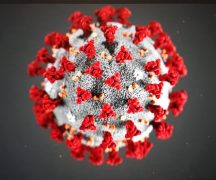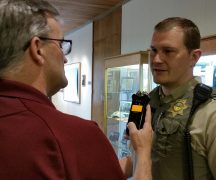By JAN LARSON McLAUGHLIN
BG Independent News
Pets do not spread COVID-19 – and they can be a source of comfort during this pandemic.
Two authorities from the Ohio State University College of Veterinary Medicine want to get the message out that Fido and Fluffy are not a threat to their humans.
“People pose a larger risk to pets than pets pose to people,” said Dr. Jeanette O’Quin, a faculty member at OSU who is an expert on animal shelters. “When you look at how many people are infected, compared to about four pets infected.”
Initial – and inaccurate – fears that humans can contract COVID-19 from their dogs and cats led some to worry that pet owners would abandon their pets to shelters. That has not proven true.
So far there have just been “isolated cases” of people surrendering their pets to shelters, O’Quin said on Friday.
“We’re very grateful for that,” she said of the low numbers.
Pets are like family members
Dr. Rustin Moore, dean of the OSU College of Veterinary Medicine, believes most people would not willingly part with their pets.
“Over 90% of people who have a pet consider their pet a family member,” Moore said. “I think that’s why we’re seeing less abandonment than expected.”
O’Quin suggested that pet owners be careful to not expose their pets to the virus.
“We still want to be cautious. We want to protect them from being exposed,” she said. “We want to treat them as any other member of our family.”
Tough financial times may put furry family members in peril
As more Americans are hit financially from losing jobs during the pandemic, it’s expected there will be people who have to surrender their pets out of necessity.
“If people are starting to relinquish pets to shelters, it could be for financial reasons,” Moore said. “That may be the circumstance COVID-19 has brought us to.”
O’Quin shares that concern.
“We know that’s definitely going to become a reality,” she said.
Shelters across the country are trying to help by providing pet food and supplies to families who otherwise would have to part with their pets.
Wood County Humane Society has a pet food assistance program.
What’s happening in Wood County?
Wood County Dog Warden Andrew Snyder has not seen an increase in abandoned dogs at the local shelter.
“We were kind of worried if we would have issues,” Snyder said. “But in our county we have not seen an issue with it.”
The same goes for the Wood County Humane Society shelter.
“We have not yet seen evidence of this,” said shelter manager Erin Moore. “In fact, I’ve seen threads in some sheltering groups that strays are down across most parts of the country and if they are picked up, they seem to be getting redeemed pretty quickly.”
The humane society has offered to take dogs from the county dog shelter during this pandemic.
“We have a lot of foster homes right now and people still waiting to foster,” Erin Moore said.
Shelters planned ahead for pandemic
Many animal shelters prepared for the COVID-19 pandemic by reducing their intake of animals and increasing their foster families to take in dogs and cats at least temporarily.
“This is an opportunity for shelters to adopt or foster out animals,” O’Quin said.
Many shelters are adapting to the stay-at-home restrictions by offering videos of the pets and delivering them to the doors of people willing to care for them.
“This is a great time for people to get a pet – or try one out,” O’Quin said.
The pet adoption rates in the nation jumped right before the pandemic swamped the nation.
“It’s been so inspiring to see how many people in communities have stepped up to take dogs home,” she said.
And shelters will be there to take in pets left behind when their owners are hospitalized or die from COVID-19, O’Quin said.
“Right after the EMS is there, they are going in to pick up the animals,” she said of shelters in the harder hit areas of the U.S.
Pets can fill the void when people aren’t present
Dogs and cats have positive effects on their humans – physically, emotionally and mentally, Dr. Moore said.
People may find they rely heavily on their pets during stressful times like these.
“When people are socially isolated from others, having pets helps,” Moore said. “Sometimes it gives them a reason to get out of bed in the morning.”
People isolating at home may have a particularly hard time now if they live alone.
“Loneliness is the biggest thing,” O’Quin said.
Cats may not be crazy about the new constant company of their humans, but dogs often crave human companionship, Moore said.
“They love it that we’re home,” he said.
More information on pets and COVID-19 can be found at the OSU College of Veterinary Medicine website at https://vet.osu.edu/about-us/news/covid-19-and-animals





